The Japan Bowl
By Robin Berrington
Member of the Japan Bowl Executive Committee
and former Cultural Affairs Officer at the U.S. Embassy, Tokyo
Do you know what the Japanese proverb "juu-nin to-iro" or the expression "peko-peko" means in English? Can you point out where the battle of Sekigahara is on a map of Japan? Can you listen to a dialogue between two Japanese and then answer questions in Japanese about what was just discussed? The 260 American students competing in this year's Japan Bowl in Washington, D.C., could.
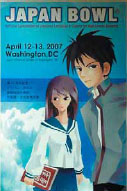 |
A promotional poster for the 2007 Japan Bowl. (Photo: U.S. Embassy, Tokyo) |
A nationwide competition for American high school students studying the Japanese language, the Japan Bowl is sponsored by the Japan-America Society of Washington, D.C. This year the Japan Bowl celebrated its 15th year on April 12-13, 2007, and had teams from as far away as Hawaii and Guam in addition to 15 states and the District of Columbia. Starting originally as a contest for schools in the Washington area, over the years it has grown to where annually it attracts over 90 teams from all over the U.S.
This year's three top winning teams at the senior level from Stuyvesant High School in New York City and Thomas Jefferson High School for Science and Technology in Alexandria, Virginia, will travel to Japan to participate in a Tokyo round of the competition, thus giving Japanese audiences a chance to experience the excitement of a real Japan Bowl. The Tokyo round will be held at the American Center on July 2. Each year the top team has received a free trip to Japan, but this is the first time that three teams will make the trip and also the first time a competition will be staged in Tokyo. Those interested in attending should contact the Tokyo American Center for more information.
The competition format is not a test of just grammar, memorization, or translation. It includes questions on Japanese culture, history, customs, and daily life. It also requires competitors to demonstrate their ability to communicate on everyday problems and concepts in real-life Japanese.
Now an official event in the National Cherry Blossom Festival, participants enjoy the opportunity to join in other Japan-related activities in Washington before and after the competition.
The Japan Bowl also encourages further study of Japan, U.S.-Japan relations, and international affairs. In fact, many Japan Bowl alumni have gone on to Japanese studies in college and to seek out further educational or employment opportunities involving Japan in government, academia, and the corporate world.
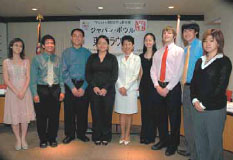 |
Participants at a special Japan Bowl exhibition at the Tokyo American Center on July 2, 2007, pose with Princess Takamado. (Photo: U.S. Embassy, Tokyo) |
The Japan Bowl is supported every year by Japanese and American companies, foundations, and individuals, as well as by the Embassy of Japan in Washington, D.C. Not only do they support a worthy educational cause, but also it gives them a chance to meet some of the future American experts on Japanese issues.
Many students fondly recall the challenge and personal achievement in preparing for and competing in the Japan Bowl. "One of the most memorable experiences in my life," was how Matthew Lopes, a member of the team that won the senior-level competition last year, described his prize-winning trip to Japan in June, 2006. Matthew is now a premed student at the prestigious University of Pennsylvania. "I will definitely return to Japan to study, and I hope someday to work and live there," he added. The reaction of this young university student to his experience with Japan shows the strong impact the Japan Bowl has had over the years.
Thanks to the Japan Bowl, knowledgeable young people like Matthew Lopes will become the future leaders of the economic, political, and cultural relationship between our two countries.
Interview in Tokyo with Members of the Top Japan Bowl Teams
On June 27, 2007, "American View" sat down with members of the three top teams in the nationwide Japan Bowl competition, who were visiting Japan in late June and early July. The students discussed why they started learning Japanese, the challenges they have faced, and their future dreams.
American View: What got you interested in Japan?
James Gerien-Chen: I took Japanese first to be able to write letters to my grandparents and also because it has a reputation for difficulty and I wanted to challenge myself in a foreign language.
Zach Frankel: Coming in to high school, we had to choose between a Romance language, Chinese, or Japanese. Given the opportunity to study a more esoteric language, it seems a bit boring to do a Romance language like the majority of high school students do. It came down to Chinese and Japanese, and I was told that 95% of the students in the Chinese-language classes were of Chinese descent and that it might be hard to keep up with them. I had also been interested in the culture of Japan from a young age.
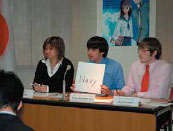 |
Members of the team from the Thomas Jefferson High School for Science and Technology answer a question at the exhibition match in Tokyo. (Photo: U.S. Embassy, Tokyo) |
American View: Why did you decide to participate in the Japan Bowl?
Elise Ko: I remember hearing about this in my freshman year, and this is the only competition I've ever participated in for academics. It was the one I wanted to go into ever since then.
Casto Unson: I just wanted to participate in as many of my school's Japanese programs as possible. Japan Bowl was one of those, along with the Achievement Exchange Program. We have a sister school in Wakayama, and every March they send over several kids. I'm actually going to stay there for 10 days after we finish here.
Christina Lee: Originally, I just wanted to go to Japan Bowl practices to improve my Japanese, and I didn't really want to join the team, because I didn't think I was smart enough. Sensei convinced me to join.
American View: How did you prepare for the Japan Bowl?
Karen Fung: We spoke to each other in Japanese and quizzed each other on random facts about Japan to try to remember everything. There's so much in addition to the language - there's history and culture, so you have to study everything. You just study everything you can get your hands on.
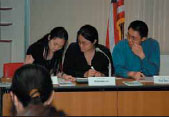 |
Members of the team from Stuyvesant High School consult on an answer to one of the questions. (Photo: U.S. Embassy, Tokyo) |
Christina Lee: It involved intense memorization. To remember the kanji, we just made lists and copied them over and over.
American View: Is it hard to learn kanji?
Casto Unson: That's probably the hardest part. I prefer to speak Japanese to reading it. Personally, I think it's more useful, because we can speak with the exchange students.
James Gerien-Chen: I think kanji makes things easier. I remember freshman year, I couldn't remember 図書館 ("toshokan," meaning "library"). Some people would always write とうしょうかん or としょうかん. Once you know the kanji, it's so much easier to remember how to "spell things." It brings the language together and makes things make sense.
Zach Frankel: When people talk about studying vocabulary for the SAT, they tell you to learn the Latin roots of words, so you can piece together the words. When you learn the kanji, you can piece things together. Today we did 消火器 ("shokaki," meaning "fire estinguisher"), and that's the same as "erase, fire, machine." Instead of remembering sounds, we can remember images and ideas.
American View: What part of learning Japanese do you like best?
Hannah Lee: I really like studying the culture, which I find really interesting. I'm sure learning the language is fun too, but I find it easy to read entire books on the culture.
Elise Ko: Japan has a fascinating history and mythology in my opinion. I like ghost stories, fantasy stories, science fiction, and things like that, so I've spent a lot of time reading about Japanese mythology, and I did my final project on Japanese ghosts.
Casto Unson: I really like Japanese food, and I learned how to cook Japanese food by watching "Iron Chef."
American View: What kind of questions were the hardest in the Japan Bowl?
Zach Frankel: The culture questions were very hard. We were once shown a picture of Sadako Ogata and asked who it was.
Karen Fung: There were also a lot of specific questions, such as, what's the population of people in Japan aged 60 and over?
Zach Frankel: In order for a team to be competitive on the national level, the members need to be able to get every single language question correct without thinking. It was the non-language questions that are the make-or-break factor at the higher levels.
American View: Since coming here, what is your impression of Japan?
Elise Ko: It's really clean. I live in the Washington area, and I'm going to college in New York, so in comparison with the cities in the United States, I've been surprised by the number of trees here. It's a very positive impression. Things seem very organized here. We were walking around last night, looking at all the bright lights and the people outside chatting.
Wei Xin Yuan: I have many impressions, as well. I come from New York City, and the subway system there does not compare to the one here. The one in New York is very noisy and dirty, but the one here is very clean and orderly, and the trains are all on time - there aren't any delays for no apparent reason. Everything just runs smoothly here. I also think Japan is a very nice society. Everything is organized. This morning when I was buying something to eat, I saw all these people on their way to work, and it just left me with the impression that everyone here follows order and does what they're supposed to do.
James Gerien-Chen: I was here two years ago.
American View: Has your impression changed at all in that time?
James Gerien-Chen: I feel like after studying Japanese for two more years, I understand so much more when I'm walking around, not only just the language itself but also, by learning the language and the culture, understanding more about the people I see on the street.
American View: Would you like to speak in Japanese?
Zach Frankel: (in Japanese) (Yes, I would.)
American View: (Do you have many opportunities to speak Japanese in America?)
Zach Frankel: (Hardly any.)
American View: (Studying must be hard, but do you guys practice speaking Japanese with each other?)
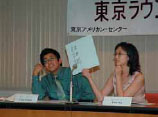 |
The Stuyvesant team holds up the answer to a question. (Photo: U.S. Embassy, Tokyo) |
Zach Frankel: (I feel that practicing speaking is very important, and our team does this together. One time we went to a Japanese restaurant and spoke Japanese the entire time. We also got a lot of practice in the classroom and at the Japan Bowl. And some times when I want to tell someone a secret, I use Japanese so other people won't understand.)
American View: (Do you plan to continue studying Japan and Japanese in the future?)
Zach Frankel: (Of course.)
American View: (Have you thought about living or studying in Japan?)
Zach Frankel: (Yes, I'd like to study here.)
Hannah Lee: (I'd like to work in Japan.)
Karen Fung: (My goal is to become an architect, so I'd like to build Japanese-style houses in America.)
American View: (In English) Do you have any idea how you want to use what you've learned in a career? Do you have any particular career goals?
Christina Lee: I'm going to a conservatory in New York, so I would really like to play a concert in Japan one day.
Zach Frankel: I might want to go into some form of biotechnology business, and there are a lot of opportunities in Japan. Generally, in whatever environment you work in, with increasing globalization, there's a large need for language abilities of all sorts, and being able to fill the Japanese niche is certainly a leg up in whatever you pursue.
Hannah Lee: I was thinking of going into business and going to a business school in September, so I was really thinking of coming to Japan, because I would have to work here. I'm definitely going to go into either investment banking or something else in banking, and one of the largest investment banks in the world is the Bank of Mitsubishi, so I was thinking of interning there in my college years.
Karen Fung: I'm planning on architecture as a career. It's actually a promise to my mom, who loves traditional Japanese houses and temples and palaces. Her favorite aspect of it is "shishiodoshi" (a bamboo fountain that strikes a stone at intervals under the weight of flowing water).
Elise Ko: One of my majors is going to be East Asian studies, and I want to work with the government and deal with Japan, China, and Korea. One of my goals is to learn all three languages. As I'm Korean, I can take lessons from my mom in that. I want to do that because I see growing globalization, and I feel that part of the world will be important. I'm Korean, and Korea is connected to both China and Japan. I see the need for cooperation between the countries.
American View: So which team is going to win the Japan Bowl demonstration at the Tokyo American Center?
Zach Frankel: Before, we were worried about winning, because winning involved a free trip to Japan. At this point, we're focused more on having a good time.
